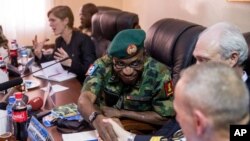The international community is facing a formidable challenge in the Lake Chad Basin region in defeating the terror group Boko Haram, while, at the same time, helping those whose lives have been thrown into chaos by the group and are in desperate need of humanitarian support.
In remarks at a UN Security Council Briefing, U.S. Ambassador to the UN Samantha Power spoke of the horrors she heard from individuals when she visited regional camps serving those who had fled Boko Haram’s violence: the looting and burning of homes; the murder of men and boys; the rape and abduction of women and girls.
A robust military effort against Boko Haram is critical, said Ambassador Power. The Multinational Joint Task force, composed of units from Benin, Cameroon, Chad, Niger, and Nigeria, is playing a growing role in improving coordination between countries, as well as in planning and intelligence sharing.
These efforts have produced important gains in recent months, including freeing thousands of hostages, destroying dozens of terrorist camps, and recovering around 75 percent of the territory Boko Haram once controlled. Ambassador Power emphasized that the military fight against Boko Haram must also include respect for human rights.
Ambassador Power applauded the European Union and the United Kingdom for their contributions to the Multinational Joint Task Force, noting that the U.S. has supported the MNJTF with more than $71 million of assistance, including advisors, logistics support and non-lethal equipment. She urged other member states to step up and support this critical effort.
Ambassador Power stressed that in addition to strengthening the military operation, much more is needed to address the dire humanitarian situation. In the last two years, the U.S. provided more than $281 million in humanitarian aid for the countries affected by Boko Haram, but they remain grossly underfunded. There are 2.5 million people displaced within their nations, and some 150,000 pushed beyond their borders. A key point: more than 90 percent of displaced people have been taken in by extended family members--a testimony to the goodness and altruism alive in the region, even as it is beset by Boko Haram’s brutal evil.
Now is the time, said Ambassador Power, for the international community to step up and assist the suffering people of the Lake Chad Basin region -- to empower the good and defeat the evil of Boko Haram.














